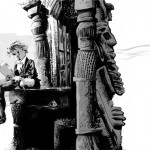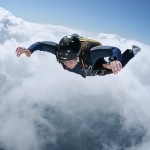From THE RESPONSIBILITY PROJECT, by Liberty Mutual
The sign just inside the doors of Surrey City Centre Library was small enough, or strange enough, that most of the patrons who’d been waiting outside filed right past it without even noticing.
Human Library—Open Today
Surrey City Library, in a bedroom community of Vancouver, British Columbia, is a just-opened Modernist gem, and it has all of the things you’d expect in a library — books and magazines and scores of multimedia options —plus one rare new thing: a small collection of “human books” that you can “sign out” for 30 minutes at a time.*
Human books are, simply, people. They are volunteers who have made themselves available to the public, as stories. They were chosen because they have something unique to say and a compelling way of saying it, and because they reflect the cultural diversity of the community. Theirs are stories that – because they don’t involve vampires or boy wizards or ladies’ detective agencies— might otherwise be lost, in the blockbuster-or-nothing climate of today’s publishing world.
The books sat at tables, waiting for readers. About half of them were mustered in a big room. Beside each was a glass of water, a timer, and a little box of breath mints. (Aesthetes might argue that printed books “breathe” – and indeed the subtle smell of paper and glue is a crucial part of the reading experience that’ll be lost when we all go fully digital. But actual bad breath would surely be a bringdown for any reader.) One book stood out. It wore a vest bearing a sign in thick black block letters: I AM A BOOK.
The vested man was named Abdifatah. He had an easy smile and red-rimmed eyes —the badge of new-fatherhood. Abdifatah was a Somali refugee who had fled that country’s civil war in the mid-1990s and resettled in Canada. His story was ostensibly about “the immigrant experience” – but that title, I discovered after checking him out, barely scratched the surface.
You don’t read a human book the way you read a regular book. The exchange is, in principle, more like a dialogue. “Ask any question that occurs to you,” Ravi Basi, the project’s co-coordinator, put it, by way of instruction. But once Abdifatah got rolling, I didn’t dare interrupt him. Around ten minutes in, the poetic heart of his tale breathtakingly emerged.
When Abdifatah was 11 years old, growing up amid growing chaos in Mogadishu, he and his older brother were kidnapped and held for months by rebel soldiers. The boys were forced into servitude, given chores like making meals and laundering bloodstained clothes. It was corrosive stuff for a little kid, and Abdifatah’s brother was determined to protect him from the worst of it. He would soften the nightmarish edges of day-to-day life by confabulating stories that sanitized the truth.
“He’d make it like a fairy tale,” Abdifatah said. “He would say, ‘Abdi, they’re hunting animals – that’s how the blood got on these clothes!’” (In actual fact Abdifatah’s brother had stripped those bloody clothes off of dead soldiers himself.) The older boy kept the younger boy’s spirits up, day after day. It became clear that this human book wasn’t really about a young African man’s transition to Western culture, as advertised. It was about brotherly love.
It is the responsibility of a community to protect its stories. So an anthropologist buy brand name ambien might argue. It is the responsibility as human beings to step into each others’ shoes on a regular basis. So a philosopher might argue. Actually, that’s one of the reasons we read books. But it’s not the only one.
We read to confirm our biases. We read to bore deeper into an area of interest. Sometimes – though not often, it must be said – we read to “challenge ourselves,” says Basi, with a book that relates experiences or beliefs that oppose our own.
That, indeed, was the founding principle of the first-ever human library experiment, launched a dozen years ago in Denmark after a tragic event. A young man had been stabbed in a nightclub, and five of his friends were grasping for answers. Violence, they concluded, is a product of ignorance and misunderstanding; it melts in light. So if potential adversaries could sit down with each other—the book and its hostile reader, so to speak — anger and mistrust could be defused. The project was born. One of its first “books’ was a policeman, and one of his first readers was an illegal graffiti artist.
Since then, a handful of other human-library experiments have sprung up here and there – notably in Australia—each nodding to the original concept, but broadening it to scratch other, less political, itches of curious readers.
After the timer on Abdifatah’s desk buzzed, signaling my time with him was up, I thanked him and moved, a little stunned, out into the main stacks. By this time more readers had found their way to the human library. One was a man who had just come to drop off a book, then co-incidentally discovered a kindred spirit in a human book named Sara Grant, the mother of an autistic boy. He promptly signed her out, and the two settled in to a quietly intense discussion. (The man’s grandson is autistic; he had done a lot of book-reading, but had spoken to precious few people in similar circumstances.)
I started giddily signing out other human books.
One was about “laughing yoga,” by a teacher of that emerging discipline. Another concerned an East-Asian woman named Anita who had remained defiantly single, despite her parents’ best efforts to marry her off. A third was about the world of competitive crossword-puzzling, told by an international champion. All of my books were chatty and unguarded –qualities of temperament that the organizers selected for. At least one book – Anita– was unaware of how great a premise she was, and unsure if she’d make a compelling read. “I was kind of worried no one would check me out,” she admitted. More than once I thought: this is the real thing, a tale told around the primitive fire—no editing, distribution or downloading required.
Moving from table to table felt dizzyingly promiscuous, like literary speed-dating. But my mind kept returning to Abdifatah and his brother.
I confess I can’t tell you the brother’s name. I forgot to ask, and now it’s too late. There’s no going back to Abdifatah to check.
Unless I renew him.
* Note that Surrey library’s human books, unlike its print books, aren’t continuously available. (That would be a lot to ask of volunteers.) Rather, they will be made available periodically. Staff have yet to decide how frequently to run human library days.
Postscript: Abdifatah has checked in. His brother’s name is Mohamed.
— Bruce Grierson

